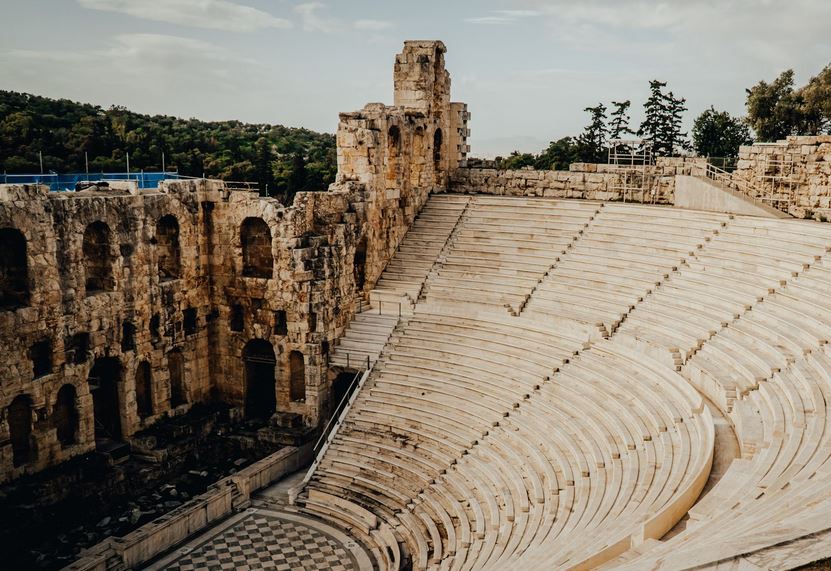Facts About Ancient Greece: The Cradle of Western Civilization |

|
|
Photo by: Dawid Tkocz |
|
More Ancient Facts: Ancient Greece, a civilization that flourished in the eastern Mediterranean for centuries, laid the foundations for much of Western culture. From its philosophical inquiries to its democratic ideals and captivating myths, ancient Greece continues to influence our world today. Here are 12 fascinating facts that offer a glimpse into this remarkable era, followed by some frequently asked questions. The Birthplace of DemocracyDemocracy, meaning "rule by the people," originated in ancient Athens around the 5th century BC. While not the same as modern democracy, it was a revolutionary concept where citizens had the right to participate in government. Home to Influential PhilosophersAncient Greece was the cradle of Western philosophy, producing iconic thinkers like Socrates, Plato, and Aristotle. Their ideas about ethics, politics, metaphysics, and logic continue to be studied and debated, as highlighted by resources like the Stanford Encyclopedia of Philosophy. The Original Olympic Games Were Religious FestivalsThe ancient Olympic Games began in Olympia around the 8th century BC as religious festivals honoring Zeus. They were held every four years and featured athletic competitions, ceasing during times of war. Mythology Shaped Their WorldviewGreek mythology, with its pantheon of gods and goddesses, heroes, and mythical creatures, played a central role in ancient Greek culture, explaining natural phenomena, moral lessons, and historical events. City-States Were Independent EntitiesAncient Greece was not a unified nation but rather a collection of independent city-states (*poleis*) like Athens, Sparta, Corinth, and Thebes. Each city-state had its own government, laws, and often, its own distinct culture and rivalries. They Made Significant Contributions to MathematicsAncient Greek mathematicians like Pythagoras, Euclid, and Archimedes made groundbreaking contributions to geometry, number theory, and calculus, laying the foundation for much of modern mathematics, as documented in historical texts on mathematics. The Development of TheatreWestern theatre originated in ancient Greece, with the development of tragedy and comedy as dramatic forms. Playwrights like Sophocles, Euripides, and Aristophanes produced enduring works that explored human emotions and societal issues. They Were Skilled SeafarersGiven their geography, ancient Greeks were skilled seafarers and traders. Their ships navigated the Mediterranean Sea, establishing colonies and trading goods throughout the region. Concept of the Library Was AdvancedAncient Greece saw the development of organized libraries, most notably the Library of Alexandria in Egypt (founded by a Greek dynasty). These libraries aimed to collect and preserve knowledge from around the ancient world. They Pioneered Historical WritingAncient Greek historians like Herodotus and Thucydides are considered pioneers of historical writing. They sought to record and analyze past events, offering insights into the causes and consequences of human actions. Architectural Marvels Still Stand TodayThe architectural achievements of ancient Greece, such as the Parthenon in Athens, showcase their mastery of design and engineering. Many of these structures, built with marble and featuring distinctive columns, still stand as testaments to their civilization. Their Language Influenced Many OthersThe ancient Greek language has had a profound influence on many modern languages, particularly in scientific, philosophical, and political terminology. Many English words have Greek roots. Ancient Greece FAQsA few more popular questions about ancient Greece. What were the main city-states of ancient Greece?Some of the most prominent city-states in ancient Greece included Athens, known for its democracy and intellectual achievements; Sparta, known for its military prowess; Corinth, a major trading center; and Thebes, which played a significant role in various periods. What was the significance of the Olympic Games?The ancient Olympic Games were a major panhellenic festival that brought together athletes from different city-states in a spirit of competition and religious observance, fostering a sense of shared Greek identity. How did ancient Greek philosophy influence the world?Ancient Greek philosophy, with its emphasis on reason, logic, and inquiry, laid the groundwork for Western thought. The ideas of philosophers like Socrates, Plato, and Aristotle have influenced fields ranging from ethics and politics to science and metaphysics, as explored by academic resources on ancient philosophy. What was the role of mythology in ancient Greek life?Greek mythology served as a way for ancient Greeks to understand the world around them, explain natural phenomena, provide moral lessons, and connect with their gods and heroes. It permeated their art, literature, and religious practices. What were some of the key contributions of ancient Greece to Western civilization?Ancient Greece made fundamental contributions to Western civilization in areas such as democracy, philosophy, mathematics, theatre, history, and architecture, shaping the intellectual, political, and artistic traditions of the West. |